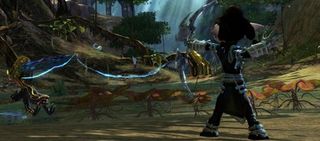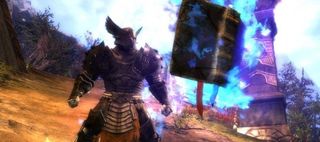How Team Fortress influenced Guild Wars 2's class system

If you've played an MMO since EverQuest, you'll be familiar with the idea of the 'holy trinity' of healer, tank, and damage classes. It's an old and tested system, and one that is popular because it allows people to shine in particular roles. Players known to be reliable healers or tanks are worth their weight in gold to guilds looking to take on the hardest bosses.
Guild Wars 2 rejects the trinity outright, opting instead for a system where every class can fill every role - they just do it differently, and the emphasis is on responding to changing circumstances rather than locking down a particular plan in advance. While at ArenaNet last week I asked game designers Ben Miller and Jon Peters whether ditching the trinity threatened a player's sense of identity.
“I'm the anti-healer person” Peters told me. “I don't hate that people like to play support roles, it's just that I want that role to be fun. I don't think there's any teamwork - what there is is just dependency.”
He drew parallels between the trinity and the way a game studio operates. “If we worked that way, we would never make a game that I enjoyed playing. I would just say 'make me my effects', and [the art team] would say "ok, here's what you've got."
“We build on it, that's what that teamwork is about, and that's the same thing the Guild Wars 2 combat is about, right? It's about organic teamwork and building stuff together.”

It's clearly a topic that the design team are passionate about. “I just detest dependency and the lack of teamwork it creates,” Peters continued. “It seems awfully silly to get people to play together and then not have them interact other than to say 'are you doing your job?', 'Yes, I'm doing it.'”
The key to redesigning MMO classes, Peters argues, is looking outside the genre - at shooters. “No-one would tell you that everyone in Team Fortress just does damage,” he says. “No-one would say a Spy and a Heavy are the same because they both do damage - they're very different playstyles. They have a very good sense of purpose.”
The biggest gaming news, reviews and hardware deals
Keep up to date with the most important stories and the best deals, as picked by the PC Gamer team.
In Guild Wars 2, what a character contributes to a party is based on their choice of weapons and abilities as well as the skill level of the player. “I'm going to be a rifle turret engineer" Peters explains, "and my sense of purpose is that [in PvP] I take capture points and I hold them. In dungeons I'm the guy who says, 'fall back to me when we're in trouble, and I'll blow my turrets up and we'll scatter.'" You develop that sense [of identity] with a playstyle rather than with a role."
Joining in 2011, Chris made his start with PC Gamer turning beautiful trees into magazines, first as a writer and later as deputy editor. Once PCG's reluctant MMO champion , his discovery of Dota 2 in 2012 led him to much darker, stranger places. In 2015, Chris became the editor of PC Gamer Pro, overseeing our online coverage of competitive gaming and esports. He left in 2017, and can be now found making games and recording the Crate & Crowbar podcast.
Most Popular






